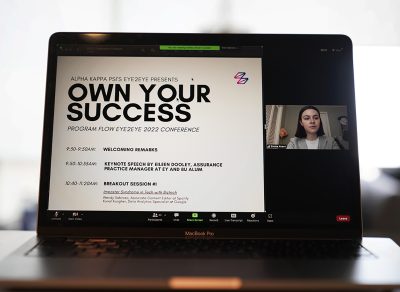Every year Eye2Eye, a student-run service organization founded by Alpha Kappa Psi, a professional co-ed business fraternity at Boston University, hosts a themed conference surrounding gender inequality in the workplace.

This year they decided to tackle the imposter syndrome phenomenon.
“Own Your Success: Overcome Imposter Syndrome and Reach New Heights,” was conducted over Zoom on Feb. 19 in collaboration with Biztech, AdClub, Pride in Business and the BU Newbury Center.
President of Eye2Eye, Emma Ahern, a senior in the College of Communication, addressed the virtual audience with opening remarks on Eye2Eye’s objective of “[pursuing] equal footing for all genders.”
“We can no longer watch as certain genders get paid less, looked over, underestimated and sexually harassed in a place of work or education,” Ahern said.
Eileen Dooley, the keynote speaker and a BU alumni and assurance manager at Ernst & Young, began by defining imposter syndrome. Dooley said imposter syndrome occurs when someone feels like “a complete fraud” and believes their achievements are just “based out of luck.”
“They’re really just thinking that they’re inadequate and incompetent despite that there’s evidence that supports that they really are truly successful,” Dooley said.
She added how imposter syndrome is disproportionately experienced by women, and went on to detail instances throughout her career in which she felt unwarranted self-doubt, as well as how she combatted these emotions.
The first of four panels began with “Imposter Syndrome in Tech,” hosted by BU’s Biztech. This segment of the event included a panel discussion with Olivia Renaud, product manager at Apple, Wendy Sabrozo, associate content editor at Spotify and Kunal Kungher, data analytics specialist at Google.
Savya Virmani, senior in Questrom School of Business and Biztech’s senior advisor, said in an interview how the club went about curating their panel. They focused on “the tech side” of understanding how the tech industry approaches imposter syndrome.
“What [employee resource groups] are available that are specific to the tech industry that other companies don’t have?” Virmani said.
Sara Sakurai, junior in Questrom and president of Biztech,
echoed Virmani’s statement, stressing how it is important to raise awareness about imposter syndrome in competitive environments.
Sakurai said the expectations to be professional in Questrom makes some people “overwhelmed.” She added while some professors do not explicitly mention imposter syndrome, they do encourage students to reach out if they are feeling this way.
The second panel, “Imposter Syndrome and Finding Your Voice,” was hosted by BU’s AdClub. It featured Juliet Tierney, director of Havas Media, Rachel Rubenstein, assistant account executive at Oglivy and Frances Symth, product marketing manager at Microsoft.
As president of AdClub, Mariya Samardzhieva, a senior in Questrom, was tasked with selecting panelists for this segment of the event.
“It was really just more so reaching out to my network and figuring out, hey, who have I really loved who would give great advice, like who’s really passionate and is really there to help people on their success,” Samardzhieva said in an interview.
Although she has suffered greatly from imposter syndrome, Samardzhieva explained, “There’s only so much I can offer but I know there’s these industry professionals who have been out there and work and found their voice and are successful people.”
Following a 10 minute break, the third panel began with remarks from Maria Dykema Erb, director of the Newbury Center, who spoke about “Managing Imposter Syndrome: Celebrate Your Successes with Newbury Center.”
The final panel was “Taking Space — Queer Women in Consulting” hosted by the Pride in Business Club. Pride in Business invited Andriana Skaperdas, platform tech consultant at EY, Malu Foley, business transformation consultant at EY, and Minette Wellborn, consultant at Oliver Wyman, to share their experiences in a male-dominated industry.
Nicholas Skaperdas, junior in Questrom and Pride in Business’s vice president of outreach, explained in an email the importance of this panel saying, “Imposter syndrome is so prevalent and so intersectional. Almost every marginalized identity has been told by the white cis-hetero elite that they are only in positions to fill a quota.”
Echoing the sentiments of many club collaborators, Skaperdas hopes the event’s attendees left with “understanding and connections.”
He explained that he has personally experienced imposter syndrome but learned to combat it.
“I now have grown into a person that understands that hard work yields results and the comments of others who I do not know are not important to me,” he said.
















































































































